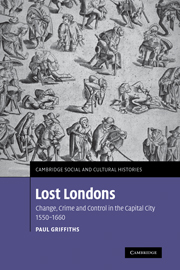Book contents
- Frontmatter
- Contents
- Maps and tables
- Abbreviations
- Preface
- Introduction: Rhetorics and records
- Part I Change
- Part II Crime
- Part III Control
- 6 Court days
- 7 Bodies
- 8 Policing: people and policy
- 9 Policing: night battles
- 10 Policing: process and prosecution
- 11 Policing: knowledge
- Conclusion
- Appendix
- Bibliography
- Index
11 - Policing: knowledge
Published online by Cambridge University Press: 15 December 2009
- Frontmatter
- Contents
- Maps and tables
- Abbreviations
- Preface
- Introduction: Rhetorics and records
- Part I Change
- Part II Crime
- Part III Control
- 6 Court days
- 7 Bodies
- 8 Policing: people and policy
- 9 Policing: night battles
- 10 Policing: process and prosecution
- 11 Policing: knowledge
- Conclusion
- Appendix
- Bibliography
- Index
Summary
Active archives
We count crime endlessly, unpicking patterns on neat graphs, but hardly ever ask what the people who produced these records did with them four centuries ago. They did not build archives for us. What is now our raw data was an active archive back then. Records were retrieved, consulted, and put to use again and again to help make policy or to gather evidence for court cases. Archives were working places, one reason why London's leaders liked to keep records safe and close at hand. When he was bringing Stow's Survey up to date, John Strype found it ‘very difficult to obtain’ access to the City's archives, and it was only with the help of ‘friends of quality and good account’ that he was able to sit down one day in the bookhouse with a clerk hovering close by to copy ‘very considerable notes’ from them. Not just anyone could drop in to read records, and magistrates were very concerned that Strype might ‘alter or prejudice the custom’ of the city. Then as now records were political, conveying policy explanations that were open to dispute or twisting in the wrong hands.
Records were brought along to the City courts if guidance was needed on a prickly matter, or if it was necessary to trace the development of a particular policy over time. Aldermen liked to have them at their fingertips, or in ‘a place att hand for storage of them’.
- Type
- Chapter
- Information
- Lost LondonsChange, Crime, and Control in the Capital City, 1550–1660, pp. 400 - 432Publisher: Cambridge University PressPrint publication year: 2008

